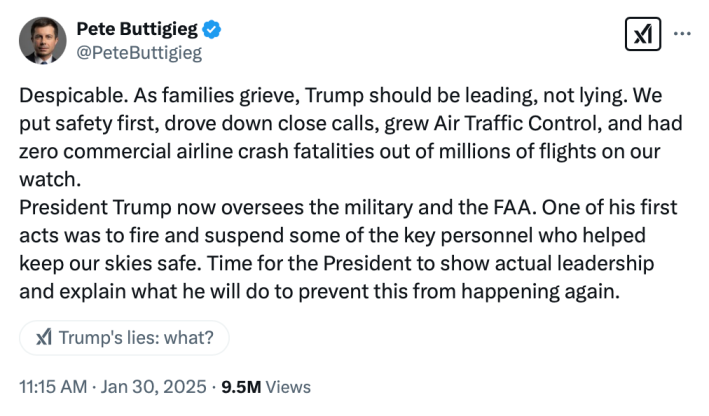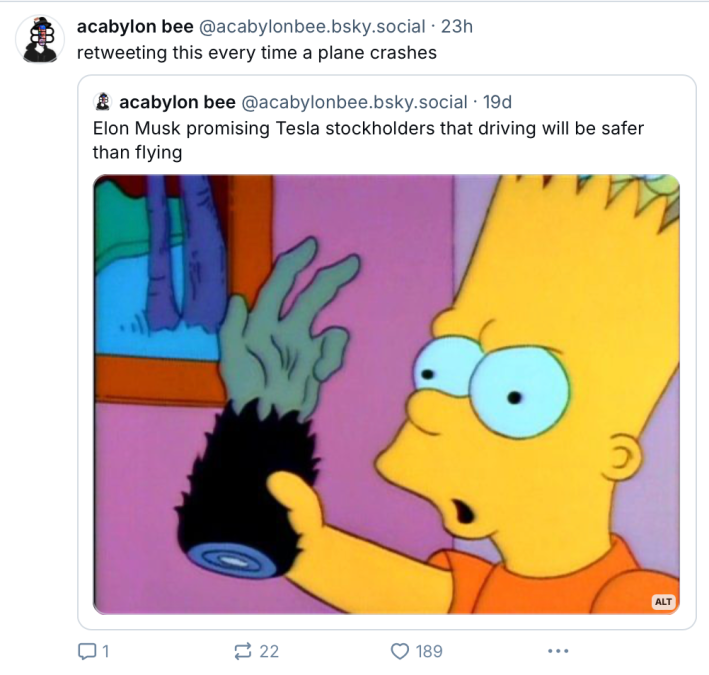All across America, planes are falling out of the sky.
Or at least that's how it seems in the news lately. For weeks, mainstream media has been dominated by aviation disasters, beginning with a Jan. 29 in-air collision that killed 67 people in D.C. — the deadliest commercial airline crash in America since 9/11 — and followed by two more crashes that have killed a total of 16 people on board those aircrafts. A fourth crash in Toronto that originated with a U.S. carrier in Minneapolis injured 18 and ended with the dramatic image of a plane upside down on a runway.
As they've rightly done after every single plane crash in recent memory, analysts have raced to uncover the structural causes of these horrifying tragedies; advocates and politicians alike have also rightly demanded accountability from the powerful decision makers who created those structural conditions, and put the flying public at risk.
But so far, that accountability seemingly hasn't come, and the crashes haven't stopped.

In the movement to end car crash deaths in America, our outraged response to plane crash deaths has long been held up as the shining counterexample to the shrug with which we treat transportation tragedies on the ground.
Advocacy groups like Transportation for America, for instance, recently compared our annual pedestrian death toll to "more than three Boeing 737s full of people falling from the sky every month for a year," with the clear subtext that Americans would simply never accept that much carnage from the aviation industry or its regulators. In their campaign to get the public to stop using the term "car accidents," Transportation Alternatives points out that "planes don’t have accidents; they crash" — and insists that we shouldn't treat road violence with any less gravity.
Those double standards aren't just about language; they also reflect what we do to save lives in future disasters, which can translate to serious differences in bodycount over time. About 800 people were killed onboard in airline crashes involving U.S. carriers between 2002 and 2022, with only two of those deaths occurring on large commercial airlines since 2010, and none since 2020. (The remainder happened on a mix of private, commuter, and military planes.)
Meanwhile, more than 855,000 people died in car crashes in the years since 9/11, including roughly 510,000 since 2010 alone.
That disparity is astonishing, even considering that half of Americans didn't even step foot on a plane last year, and that the average U.S. resident climbs into a car around four times every day. It's even more astonishing in comparison to European nations, where car crash death rates are a fraction of ours, and are trending sharply downward. And many argue that it's not entirely explained by the fact that airlines rely on highly trained pilots while car-centric America functionally requires everyone over the age of 15 to get behind the wheel, whether they're qualified to do so or not.
"Society expects absolute safety in plane travel," Marina Bolotnikova wrote for Vox in 2023. "Catastrophes are never meant to happen, and any loss of human life is considered unacceptable. A vast federal bureaucracy exists to make sure no one dies in a plane crash. So, what would happen if we treated cars like we do planes?"
In the last few weeks, though, I find myself asking a disturbing inversion of that question: are we seeing the dawn of an era when America treats planes like we do cars, and fails to address the structural causes of those disasters?
And if we are, what does that say about how our collective attitudes towards transportation violence are beginning to shift — and what might that mean for the next chapter of the road safety movement?
To be clear, I don't believe the U.S. has taken a flying leap out of the Overton window just yet.
Early theories about what caused the recent plane crashes vary and the NTSB has only delivered preliminary findings on some, but most Americans still seem to intuitively understand that airline crashes are never solely the fault of a few fateful mistakes committed by pilots and air traffic controllers, even when human error does play a role. Certainly, no one seems content to write off the recent tragedies as individual crimes or unavoidable accidents, like we do with car crashes every single day.
The American people are still demanding systems-level solutions to keep planes in the air; they still want multiple layers of safety nets to catch them if they fall, and they expect their regulators and industry leaders to constantly repair the threads of those nets when they fray.

Those safety nets, though, are not all equally strong, and our power to strengthen them — or shred them — is not equally distributed.
When President Trump made the unsubstantiated claim that former President Joe Biden's "diversity, equity and inclusion" hiring initiatives among air traffic controllers were to blame for the D.C. crash — a statement which was decried by various Democratic politicians as outrageous, despicable, and offensive — he yanked at a thread that is deeply woven into every layer of our collective safety nets: the public's trust in government itself. (That he tied that thread to Americans' inherent biases, of course, only made those nets easier to unravel.)
When he followed that statement, weeks later, by firing hundreds of Federal Aviation Administration employees — including staffers preventing planes from crashing into buildings, construction cranes, and windmills, those responsible for making sure that pilots are medically safe to fly, and more — he tore even wider holes in the canopy, even if advisor Elon Musk claimed that "to the best of our knowledge, no one affecting safety has been fired."
By politicizing transportation tragedies, blaming individuals for systemic violence, and undermining the role of government in solving it all, even one of the safest transportation systems in the world — the American airspace — could quickly be reduced to a threadbare vestige of what it once was. And then the same government that gutted it can claim that we would all be better off if we let corporate interests take control.

Of course, Vision Zero advocates know a lot of this already; we've been staring into the gaping holes in our roadway safety nets for years, and begging our leaders to mend them, or at the very least to acknowledge they are there.
But if we are entering a new era where our leaders at the highest levels of government are blaming the nets themselves for strangling our progress as a nation — even among air travelers, whose lives we have historically fought to protect much more fiercely than the predominantly BIPOC and low-income travelers who die on the ground — then it will mean our tactics as a movement have to change.
In the realm of road safety, it will mean that we will need to build more more safety nets at the local and state levels to compensate for the absence of federal protections, as well as the the presence of new federally-empowered threats, like more money for destructive highways.
It will mean we need to create new ways of collecting data on who falls through the cracks so we can deliver interventions where they're needed most, without relying on a state apparatus that is racing to erase that critical work.
Most of all, though, it will mean acknowledging that building safe systems was never about just building bike lanes and writing speeding tickets — or hiring pilots and air traffic controllers, for that matter. It is about naming the vast and overlapping systems of power that are supposed to protect us all from violent death, identifying who is responsible for maintaining them, and demanding better when they fail. That is the thread that is woven through our entire transportation safety culture, on the air and on the ground — and it is not too late reinforce it.






